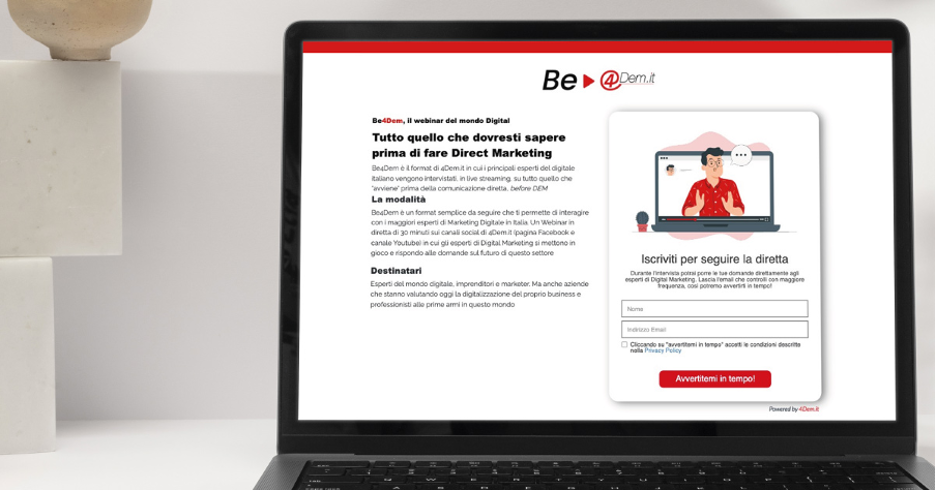Direct email marketing is one of the most effective ways to develop your business, whether you’re a small, medium or large company. This is because it allows you to send targeted communications quickly and easily, especially through the use of automation platforms.
However, implementing a direct email marketing strategy that is fully GDPR-compliant may seem like a daunting task. But it isn’t!
In this article, we’ll give you some tips on how to implement a GDPR-compliant direct email marketing strategy, step-by-step.
How to implement GDPR-compliant capture forms?
Before implementing your strategy, it’s good to have a well-constructed database of contacts who are genuinely interested in your business. Most importantly, it should be built in compliance with GDPR regulations!

How can I collect contacts in a compliant way? By creating registration forms that can be placed on the web pages of your website for your users to sign up to. To be compliant, the form must have the following characteristics:
- include unchecked boxes for each consent required;
- each consent must be explicitly stated next to its own checkbox;
- include your site’s privacy policy so that each new subscriber knows how their information will be used;
- if the form is used to request a product or service, consent requires a dedicated and specified checkbox.
Once the user has subscribed to the form, it is good practice to send a double opt-in email to request final confirmation of subscription. In this case, personal data cannot be used until the user has confirmed their registration via double opt-in.
It is also a good practice to allow the subscriber to manage the consent given by modifying or deleting it.
How to do direct email marketing and be GDPR compliant?
After collecting contacts, it’s time to implement your direct email marketing strategy in a GDPR-compliant way.

Privacy policy
Your users have the right to know how you use their contact and personal information. Therefore, you must include a link to your company’s privacy policy in all your email communications, explaining what data is collected and how you will use their data.
If you use 4Dem, the all-Italian GDPR-compliant direct email marketing platform that allows you to send not only newsletters, but also SMS campaigns, automated flows, landing pages and forms & pop-ups to collect contacts, you must mention this in your privacy policy.
Mailing List Management
Did you know that mailing lists have an expiration date? The data collected can be used for the time necessary to fulfill the objective, after which the data must be deleted.
In fact, according to the GDPR, personal data must be “kept in a form which permits identification of data subjects for no longer than is necessary for the purposes for which they are processed” (Article 5).
Tips for implementing a GDPR-compliant strategy
Now that you know the key steps to take when implementing a GDPR-compliant email marketing strategy, here are some tips to follow when implementing a GDPR-compliant strategy:
- Create and write a comprehensive privacy policy that is easily accessible and clear for everyone to read.
- Use double opt-in emails to get consent from your users to use their data.
- Beyond your website and communications, your entire organization must be compliant.
- Ensure that external services and software used for your strategy are GDPR compliant.
- Make your mailings transparent – sender anonymity is not allowed by law.
- Include a privacy policy and an unsubscribe link in all your communications.
- If the data retention period is exceeded, always ask for consent to use the data.
- Set up a consent register to store all the consents obtained from each subscriber.
- Do not use email addresses of individuals purchased online.
- Collect contacts in a compliant and explicit manner through acquisition forms, newsletter subscriptions, or explicit requests.
What are the consequences of non-compliance?
In the event of a breach of the law, the regulation provides that users can report it to the supervisory authority, and if this happens, the latter will have the opportunity to verify whether or not the processing operations were carried out in compliance with the regulation.
In the event of a violation of the GDPR, there are a number of sanctions that can be imposed.
The consequences can be not only a sanction, but also the prohibition of the use of the stored data and contacts. For example, in the case of email marketing, the use of the database will no longer be possible, with penalties varying depending on the severity of the situation.
There is also the risk of disrupting the use of third-party services, such as email marketing platforms. Not to mention the damage to a company’s reputation. If a company fails to comply with GDPR and is sanctioned, users are unlikely to trust them with their personal data.
